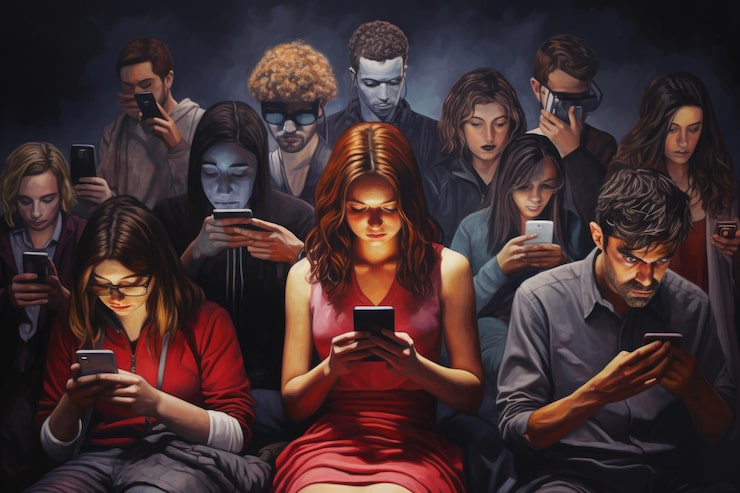
Social media was once about connecting friends, sharing travels, and celebrating milestones. But in recent years, it has also become a disturbing stage where moments of tragedy are consumed as easily as a dance trend or a new recipe video. For Generation Z, a group that has grown up fully immersed in digital platforms, this normalization of violence carries serious consequences for empathy, mental health, and our collective humanity.
The Rise of Viral Violence
Two recent tragedies underscore this troubling shift. The assassination of conservative commentator Charlie Kirk and the violent death of 23-year-old Ukrainian refugee Iryna Zarutska were not just reported as news—they were streamed, shared, and replayed on social media. Videos of their final moments circulated widely, slipping into the endless stream of algorithm-driven feeds.
For viewers, especially younger users, these graphic clips appeared between lighthearted videos of pets, travel, and beauty tutorials. This surreal juxtaposition makes violence feel like just another form of content. The impact is not only emotional but also cultural, gradually eroding society’s sense of shock and empathy.
The Desensitization of a Generation
Generation Z is the first to come of age in an environment where exposure to death and violence is often unfiltered. The constant autoplay of platforms like TikTok means users may encounter disturbing material without warning. Even those who actively avoid such videos risk stumbling upon them by accident, their feeds shaped by opaque algorithms designed to maximize attention.
The problem is not only about seeing violence but also about how it is consumed. Online, tragedy can be replayed, dissected, and commented upon with detachment. What would once have been unforgettable trauma risks being absorbed as disposable content. This desensitization carries long-term consequences for how young people process empathy, compassion, and even the value of human life.
Lessons From the Past

This is not the first time society has grappled with the display of human suffering. After the September 11 attacks, news outlets wrestled with the ethics of showing graphic footage. Television networks and newspapers made careful editorial choices to balance public interest with respect for victims and their families.
But today’s social media platforms often bypass those ethical considerations. Algorithms do not ask whether an image is too traumatic or whether showing a death honors or exploits the victim. They simply calculate what keeps people scrolling. Unlike the editorial boards of traditional media, tech companies have been slow to assume responsibility for the moral weight of their platforms.
The Role of Algorithms in Shaping Behavior
At the heart of this issue lies algorithmic amplification. When a user engages with videos of fights, brawls, or other sensational content, the platform serves up more of the same. The line between curiosity and compulsion blurs quickly. What begins as a fleeting glance at shocking content can spiral into repeated exposure, numbing viewers over time.
Experts warn that such repeated exposure can normalize aggression, making it appear routine rather than exceptional. In turn, this shapes online culture, where outrageous or violent posts garner more attention than thoughtful or positive ones. The ripple effect extends offline, influencing attitudes toward conflict, safety, and even the way people interact face-to-face.
The Weaponization of Content
Social media has also become a tool for those seeking to weaponize content. From extremist groups broadcasting violent acts to individuals seeking notoriety through shock value, the viral nature of platforms amplifies harmful agendas. For victims and their families, this weaponization of suffering represents a profound violation of privacy and dignity.
Moreover, the intersection of digital and physical safety grows increasingly blurred. A violent act committed for the camera is not only a tragedy in itself but also a message designed to intimidate, manipulate, or recruit. The stakes extend beyond personal trauma into matters of national and global security.
Finding a Path Forward

The solution cannot rest solely on individuals making careful choices about what they watch. The architecture of social media itself needs greater accountability. Platforms must address the autoplay features, algorithmic amplification, and lack of effective content moderation that allow violent videos to spread unchecked.
Parents, educators, and policymakers also have a role to play. Media literacy must expand beyond spotting fake news to include understanding the ethical impact of consuming real violence. Teaching young people to recognize that every video clip represents a real person, with real loved ones left behind, is essential for rebuilding empathy in the digital era.
A Call for Digital Decency
The challenge of desensitization is ultimately a test of values. Do we want a culture where human suffering becomes entertainment, where violent deaths are consumed alongside comedy skits and makeup tutorials? Or do we want to reclaim our digital spaces as places of connection, creativity, and respect?
Generation Z, as the first truly digital-native cohort, has the opportunity to lead that shift. By demanding transparency from platforms, practicing empathy online, and refusing to share exploitative content, they can begin to turn the tide.
Toward a More Human Digital Future
Social media will remain a powerful force in shaping culture and communication. But with that power comes responsibility. If unchecked, the viral spread of violence threatens not only the mental health of individuals but also the fabric of society itself.
The path forward requires collaboration between platforms, policymakers, and users. By prioritizing human dignity over shock value, we can create a digital future where technology serves humanity rather than desensitizing it.
In the end, the question is not whether violence will appear online—it already does. The real question is whether we, as a society, choose to watch, share, and normalize it, or whether we take a stand for empathy, respect, and decency in our digital lives.




(0) comments
We welcome your comments
Log In
Post a comment as Guest
Keep it Clean. Please avoid obscene, vulgar, lewd, racist or sexually-oriented language.
PLEASE TURN OFF YOUR CAPS LOCK.
Don't Threaten. Threats of harming another person will not be tolerated.
Be Truthful. Don't knowingly lie about anyone or anything.
Be Nice. No racism, sexism or any sort of -ism that is degrading to another person.
Be Proactive. Use the 'Report' link on each comment to let us know of abusive posts.
Share with Us. We'd love to hear eyewitness accounts, the history behind an article.